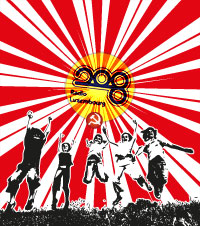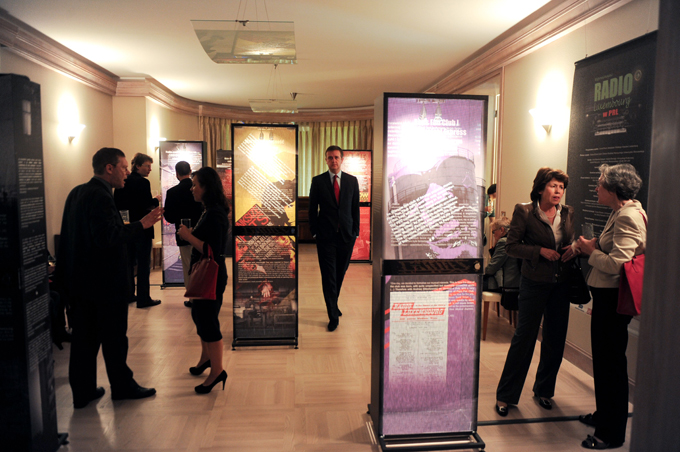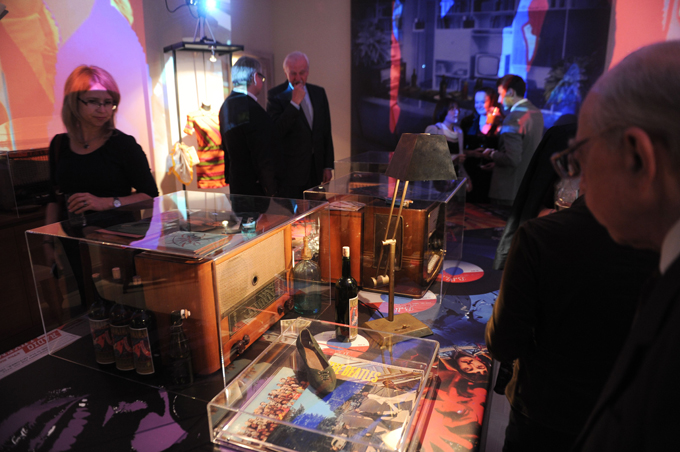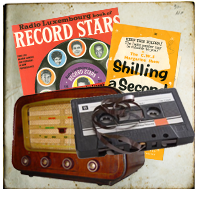 Radio Luxembourg was an expression of freedom and liberty for a whole generation in Western as well as Eastern Europe, and therefore had a major impact on society, especially in the 1950s and 1960s. Although it was clearly apolitical, some even claim that Radio Luxembourg, the famous ‘Two-O-Eight’ helped to undermine communism with the rock and pop music it broadcast by triggering a desire for change and liberty among young people behind the Iron Curtain.
Radio Luxembourg was an expression of freedom and liberty for a whole generation in Western as well as Eastern Europe, and therefore had a major impact on society, especially in the 1950s and 1960s. Although it was clearly apolitical, some even claim that Radio Luxembourg, the famous ‘Two-O-Eight’ helped to undermine communism with the rock and pop music it broadcast by triggering a desire for change and liberty among young people behind the Iron Curtain.
An exhibition organised by the Luxembourg Embassy in Warsaw and the Faculty of History of the Warsaw University from 16 May to 22 June 2012 highlighted the role of Radio Luxembourg in Poland during the Cold War – ‘Wspominając Radio Luksemburg w PRL’ (Remembering Radio Luxembourg in the People’s Republic of Poland). It aimed to show how the music and information broadcast by Radio Luxembourg was used, processed and adapted by the people of Poland during the 1960s and 1970s.

Exhibition at the luxembourgish Embassy in Warsaw

Conrad Bruch, Ambassador of the Grand Duchy of Luxembourg:
In October 2010 I came to Warsaw as the new Ambassador of the Grand Duchy of Luxembourg to the Republic of Poland. During my first courtesy calls to Polish politicians, high-level civil servants and business people I was struck by the fact that so many of my interlocutors spontaneously associated my country first and foremost with Radio Luxembourg. Indeed, many representatives of modern Poland’s political, economic and cultural elites regularly listened to the English-language programmes of Radio Luxembourg in their youth. By chance, soon after my arrival in Poland, I was able to watch “Był Luksemburg…” [Once upon a time, there was Luxembourg…] – Piotr Boruszkowski’s and Zbigniew Sabat’s fascinating 2008 TV documentary dedicated to Radio Luxembourg’s huge impact on communist Poland during the late 1960s and 1970s. (…)
Listening to Radio Luxembourg in Poland was incredibly popular with young people during the late 1960s and the early 1970s. It was a real social phenomenon. For young people in Poland at the time, despite the Cold War and the Iron Curtain, Radio Luxembourg became an opening to the free world, a bridge towards the alternative youth cultures of the West. Radio Luxembourg allowed young people to dream their dreams and to indulge in visions of a colourful world, very much in contrast to Communism’s grey and oppressive reality.
It is also true, of course, that many established radio stations in Western Europe were still very conservative at the time and would refuse to play the kind of music so much desired by young audiences. Radio Luxembourg played a very significant modernising role here too.
Contrary to what was done for Radio Free Europe and Voice of America, the Communist authorities never resorted to systematically jamming Radio Luxembourg’s signal, probably because it was so apolitical. Radio Luxembourg was indeed a purely commercial, non-political broadcast, intended for an English-speaking audience in Western Europe. With the technology available at the time a radio signal intended for the West would necessarily also go East, South and North. Programme directors at the time – even if we are quite sure that at least some of them were perfectly aware of their listeners behind the Iron Curtain – were not deliberately focusing on the Central and Eastern European region.

Jacques Santer, Conrad Buch and Dan Wiroth (from left to right)
Prof. Elżbieta Barbara Zybert, Dean of the Faculty of History:
Radio Luxembourg, which has been broadcasting its programmes for nearly 80 years and addressed them primarily to listeners from Western and Central Europe, also played a major role in pre-transition Poland. For many Poles it constituted a window to the outside world, especially between the years 1968–88 when its popularity reached its peak. Although the radio played music mainly for the young, older listeners could also find something for themselves within the programmes – which promoted music for people of various ages.
Thanks to the RL programmes (…) one could become acquainted with the fashions of the Western music scene which were otherwise not available in our country as there were no other places to listen to or buy records of popular Western performers. And the Top Twenty programme – with the most popular songs at the time, gave us an illusion that we knew what was going on in the world of European music for young people.
Nevertheless, the significance of Radio Luxembourg was not only limited to popularizing music. There was a lot more to it. News delivered in brief bursts, humorous interviews with band members and artists and the unconventional manner of presenting the programmes gave us an idea of a different kind of radio journalism, unknown to us at the time, as well as the free English lessons during the broadcasts. (…) Radio Luxembourg was a choice, a lesson in democracy which was unknown to us then.
Undoubtedly for many people of my generation the name Radio Luxembourg signifies a time of youth and the thought of those years reinforces what was good and meaningful during this time. This meaning remains in my memories of Radio Luxembourg.
Anna Malewska-Szałygin PhD:
Listening to Radio Luxembourg played a key role for many people during these times. Some respondents recalled calm evenings, when, in the surrounding stillness of the night, they would turn the knob of the radio set to catch – amongst the hums and cracks –music so different from that available on Polish radio at the time. They talked about the delight of being presented with a record of the music listened to on Radio Luxembourg. They recalled house parties and dancing to that music, and the romantic (and not so romantic) events connected with it. For future radio professionals there was a new manner of presenting programmes and for future musicians the new rhythms and melodies were ground breaking. (…)
Accessing music and information required overcoming a series of barriers and the mixture of information and music was in strong demand. The first barrier was the “discovery” alone of the music source – Radio Luxembourg. It captivated listeners through the uniqueness of music and the freedom of presenting the programme, unprecedented on Polskie Radio [Polish Radio] of the 1960s and 1970s.
For the listener a contact with Radio Luxembourg really was a kind of cultural shock, something never forgotten. Young people discovered a more entertaining type of radio broadcast, something catering to openness and the thirst for knowledge. Access to the latest music and global news feeds are the substructure of our information era. The discovery of Radio Luxembourg would be for contemporary listeners like the first contact with an internet website – allowing them to listen to music from other continents, to learn from another world. (…)
Knowing the newest charts of Radio Luxembourg was an indicator of the ability to “stay abreast”. Information about the “Top Twenty” was so significant that they were noted in special notepads and attached to school news boards. Noting the titles of songs and names of performers was a difficult task and was a good motivation to learn English. (…)
The uniqueness of Radio Luxembourg was not only in the music but also in the method of presenting it to the listener. An entire generation of Polskie Radio and TV presenters learned how to shape communication from RL. Modern media, based on directness and exaggeration evolved in real time, between jingles and the excitement of the presenter.
Wojciech Mann, music journalist:
Radio Luxembourg somehow reached Poland with quite a decent signal. I thought decent quality as the conditions, in which one could catch a melody or even hear an announcement amongst the humming, screeching and whistling. Apart from this, Luxembourg broadcasted on medium wave (208 metres) as well as short wave (49.6 metres). This was a cornucopia of music, which I had hitherto only dreamed of. It was not only the difference in musical repertoire which was astounding but also the way the programmes were presented which was modeled on American stations. If someone was used to the static and unhurried tone and rhythm of Polskie Radio, then the first contact with Luxembourg was completely shocking (…) I sat next to the radio set with my head nearly stuck to the speakers and absorbed everything. Songs, titles, information about performers, records, language, all the news – even scraps of it. The culmination of my nights with Luxembourg was the ‘Top Twenty’, the twenty most popular songs of the week. It was presented by Barry Alldis, an Australian gifted with a fantastic, slightly nasal voice.
Listener from Gorzów:
I remember listening to it regularly on Saturday evenings when they played a lot of popular music which gave some idea of what was happening in the world. I also remember the characteristic voice of the presenter saying ‘Radio Luxembourg’ and this was repeated all the time. That’s the first time I heard the Beatles and felt a complete fascination and excitement.
Listener from Pruszków:
It was definitely a radio for young people, a breeze of fresh air, something quite different from what we were surrounded by. It was a revelation to know that young people in the world were having fun, being happy and here we struggled with everything in order to have the same thing they had at their fingertips.
Jerzy Gluziński, listener from Warsaw:
Radio Luxembourg was something completely different to listen to. First of all you had to find it. And in order for Radio Luxembourg to be received at all it had to be dark. During the day the range of medium waves didn’t allow for this. It was also quite far away from us, so I made a special antenna, which went about 20–30 meters out of the window. This was done especially for this radio, so we could listen and get a decent signal. Back in those days radio sounded completely different and you have no idea what it was like on short wave.
Witold Sikorski, lecturer, Warsaw Institute of Technology:
I was the editor of the school newspaper and I knew English well so I did the overview of Radio Luxembourg, its music charts. I wrote down all the titles from the charts, what was new, the rankings and so forth. Then at 5am I would sit at the typewriter, I would type it all up and on Monday we had it in the newspaper. Our school was best informed in terms of Radio Luxembourg news.
Piotr Śmietanowski, editor of music magazines:
Radio Luxembourg was not illegal and was not subject to jamming, (…) even though this music was not in official circulation. ‘Radio Free Europe’ was illegal and ‘Voice of America’. (…) Today I would say that Radio Luxembourg had the advantage of being beautifully apolitical and completely non-partisan.
Franciszek Walicki, band creator and lyric writer:
We were guests of the famous ‘Station of the Stars’ of Radio Luxembourg as the first rock band from behind the Iron Curtain. On the night of 31st October/1st November 1967 Colin Nicol – the English presenter who was very popular at the time and influential – made an interview with the band [on air], illustrated by songs. (…) so Niebiesko-Czarni [Blue-Black] were the first Polish band hosted on Radio Luxembourg.
All excerpts are taken from the exhibition catalogue ‘Wspominając Radio Luksemburg w PRL’ (Remembering Radio Luxembourg in the People’s Republic of Poland) edited in 2012 by the Embassy of Luxembourg in Warsaw and the Faculty of History of the Warsaw University.

